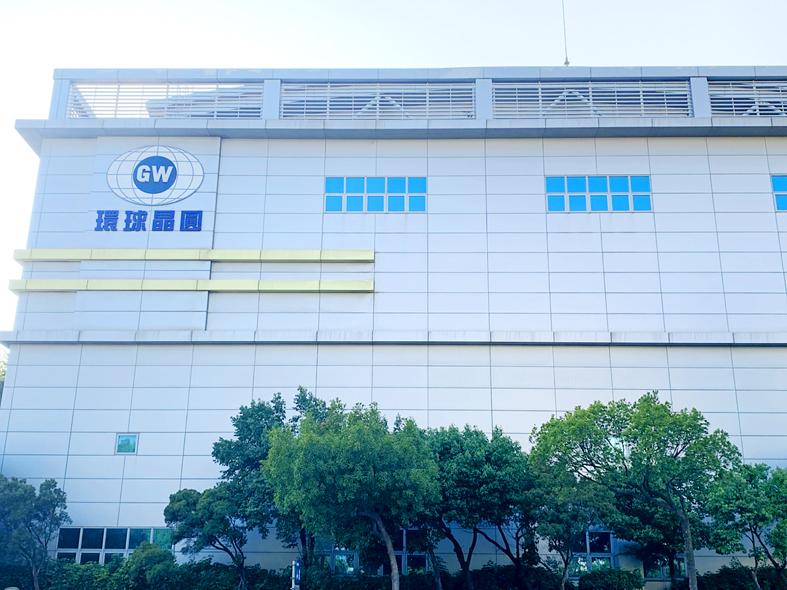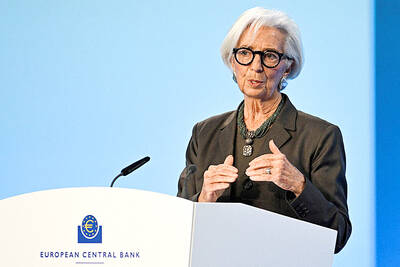GlobalWafers Inc (環球晶圓), the world’s No. 3 silicon wafer supplier, yesterday said that a new 12-inch fab to be built in Italy would begin operations in the second half of next year to meet customer demand.
The fab, the first 12-inch fabrication facility in Italy, has received robust support from European customers, the Hsinchu-based company said.
Construction would begin as soon as subsidies are approved, it said, adding that it expects to receive funds from the Italian government and from a new EU project that aims to build a more resilient chip supply chain in Europe.

Photo: Grace Hung, Taipei Times
“Demand remains very healthy and very good. Supply is still very tight. For GlobalWafers, our capacity in 2022, 2023 and 2024 is basically sold out,” GlobalWafers chairwoman Doris Hsu (徐秀蘭) told a virtual investors’ conference.
“We still cannot provide all the volume requested by our customers,” Hsu said.
Amid robust demand from customers, GlobalWafers received NT$28.64 billion (US$1 billion) in prepayments as of the end of last year, it said, adding that the figure is still rising.
Average selling prices this year are expected to continuously increase, Hsu said.
The increase would further boost the firm’s gross margin this year from 38.1 percent last year, she said.
The new fab in Italy is part of a NT$100 billion project to expand capacity. The company also plans to invest in existing manufacturing sites in Taiwan, Denmark, Japan, South Korea and the US.
Russia’s invasion of Ukraine has not had a direct impact on the company, given that its European factories are in Denmark and Italy, Hsu said.
No customers have scaled back orders or expedited shipments, she added.
However, geopolitical tensions have increased transportation and energy costs at its European factories, she said.
The global chip crunch is expected to stretch into next year, in spite of recent signs of easing supply constraints, Hsu said, adding that the shortage is expected to be resolved in two to three years.
The firm reported NT$11.87 billion in net profit last year, down 10.4 percent from NT$13.1 billion in 2020, due to a 50 million euro (US$54.92 million) termination fee after the Siltronic AG takeover fell through. Earnings per share fell to NT$27.27 from NT$30.11 in 2020.
Gross margin last year increased to 38.1 percent from 37.2 percent in 2020, while revenue rose 10.4 percent to NT$61.13 billion, a historic high, the company said.

European Central Bank (ECB) President Christine Lagarde is expected to step down from her role before her eight-year term ends in October next year, the Financial Times reported. Lagarde wants to leave before the French presidential election in April next year, which would allow French President Emmanuel Macron and German Chancellor Friedrich Merz to find her replacement together, the report said, citing an unidentified person familiar with her thoughts on the matter. It is not clear yet when she might exit, the report said. “President Lagarde is totally focused on her mission and has not taken any decision regarding the end of

French President Emmanuel Macron told a global artificial intelligence (AI) summit in India yesterday he was determined to ensure safe oversight of the fast-evolving technology. The EU has led the way for global regulation with its Artificial Intelligence Act, which was adopted in 2024 and is coming into force in phases. “We are determined to continue to shape the rules of the game... with our allies such as India,” Macron said in New Delhi. “Europe is not blindly focused on regulation — Europe is a space for innovation and investment, but it is a safe space.” The AI Impact Summit is the fourth

STRATEGIC ALLIANCE: The initiative is aimed at protecting semiconductor supply chain resilience to reduce dependence on China-dominated manufacturing hubs India yesterday joined a US-led initiative to strengthen technology cooperation among strategic allies in a move that underscores the nations’ warming ties after a brief strain over New Delhi’s unabated purchase of discounted Russian oil. The decision aligns India closely with Washington’s efforts to build secure supply chains for semiconductors, advanced manufacturing and critical technologies at a time when geopolitical competition with China is intensifying. It also signals a reset in relations following friction over energy trade and tariffs. Nations that have joined the Pax Silica framework include Japan, South Korea, the UK and Israel. “Pax Silica will be a group of nations

CONFUSION: Taiwan, Japan and other big exporters are cautiously monitoring the situation, while analysts said more Trump responses ate likely after his loss in court US trading partners in Asia started weighing fresh uncertainties yesterday after President Donald Trump vowed to impose a new tariff on imports, hours after the Supreme Court struck down many of the sweeping levies he used to launch a global trade war. The court’s ruling invalidated a number of tariffs that the Trump administration had imposed on Asian export powerhouses from China and South Korea to Japan and Taiwan, the world’s largest chip maker and a key player in tech supply chains. Within hours, Trump said he would impose a new 10 percent duty on US imports from all countries starting on